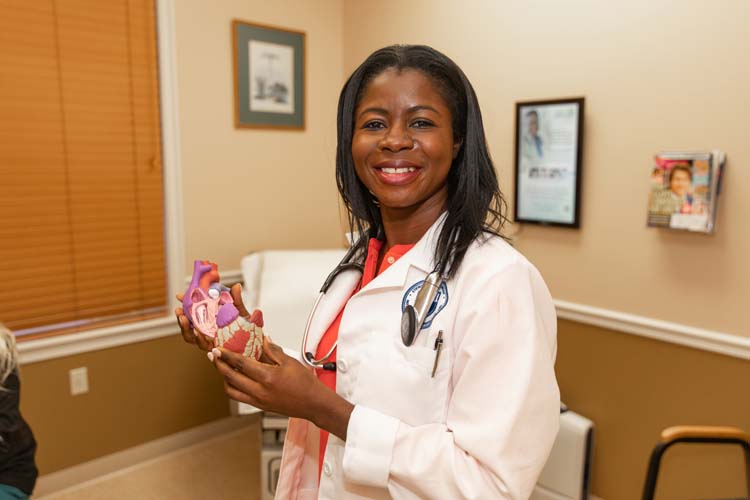
Worried about a heart attack brought on by coronary artery disease (CAD)?
Dr. Lilian Ahiable, a fresh face at the Steward Medical Group in Vero Beach, is using a modern mantra to help stop CAD.
There is, she says, an app for that.
And why not?
The American College of Cardiology says that every 40 seconds, someone in this country dies from CAD.
Indeed, the ACC says cardiovascular diseases in general and coronary artery disease in particular account for roughly 800,000 U.S. deaths a year.
If an “app” can help slash those numbers, that’s got to be a good thing.
“I have it on my phone,” says Ahiable. “You can plug in your risk factors and it ranks your 10-year risk of having a coronary artery disease. It gives you a score.”
For the record, CAD is the narrowing or blocking of arteries leading to the heart. It is caused by the buildup of cholesterol and fatty plaque deposits along the inner walls of those vessels. If that plaque restricts or blocks the flow of blood to the heart, a heart attack – and sometimes death – can occur.
But Ahiable is also quick to point out that while an app might be able to predict, it can’t by itself protect you from developing CAD. She cites risk factors that include “high blood pressure, diabetes, high cholesterol and obesity,” which are largely up to the patient to address.
But the app can serve as motivation to change bad habits and seek needed treatment, and addressing those risk factors earlier in life can make a big difference later on.
Today, Ahiable says, pediatricians as well as primary care physicians are actively looking for telltale signs of CAD so that “lifestyle changes” including diet and exercise can be put into play sooner rather than later.
Let’s face it: Old habits are hard to break. It’s easier to start healthy habits early in life and stick with them.
Take, for example, what we eat.
“What we advocate now in terms of diet,” Ahiable explains, “is the Mediterranean diet, which is based on olive oil, legumes, beans, fruits and vegetables and more of those than your red meat. And more exercise.”
The American Heart Association now recommends that everyone over the age of 20 get a cholesterol test or lipid panel to determine their low-density (bad) cholesterol, high-density (good) cholesterol and their triglycerides, but the rules – or guidelines – for lipid panels have, according to Ahiable, recently been revised.
“So what the guidelines say now,” she says, “is if a patient has significant risk factors such as hypertension, high cholesterol, coronary artery disease or diabetes, they automatically go on a high intensity statin.
“Initially if someone comes to me with the high blood pressure, I would love to see them again in three to six weeks [to see how prescribed treatment is working]. And what I would probably advocate is for them to have one of those blood pressure monitors at home to check it while they’re on the medication and we also do some lifestyle changes. Once the patient is stable on a medication, it’s mostly going to be maybe every six months to a year check-up, mostly just make sure that everything is going on well.”
The good news, according to Ahiable, is that while statins used to be something patients had to take for the rest of their lives, today it’s generally accepted that in many cases, with changes in diet and exercise routines, “we can probably get them off that medication.”
When asked why, in an area chock-full of cardiologists, people on the Treasure Coast should come to see her, she pauses and flashes a winning smile. “I’m fresh from training. I have the latest updated information on cardiovascular care. I’m very outgoing. Very patient-oriented. Very friendly and I definitely give the best care that is out there.”
Dr. Lilian Ahiable is with the Steward Medical Group in Vero Beach at 3745 11th Circle, Suite 105. The phone number is 772-794-7791.



